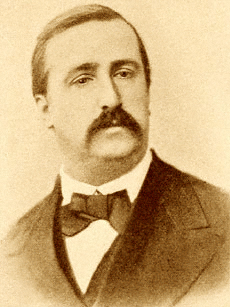PIECE: "NOCTURNE" FROM STRING QUARTET NO. 2
SECTION 4.10
| "Nocturne" from String Quartet No. 2 |
Aleksandr Porfir'yevich Borodin (1833-1887) completed his String Quartet No. 2 in D major in 1881. Aleksandr Borodin was a Russian composer who was trained as a medical doctor, and had a career as a professor of chemistry. He was the illegitimate son of Prince Luka Stepanovich Gedianov (Gedianishvili) and was given the surname of one of his father's serfs, Borodin (Aleksandr was legally registered as the son of his father's serf, Porfiry Ionovich Borodin). Borodin's mother, Avdot'ya Konstantinovna Antonova, raised him in St. Petersburg, and through Prince Luka's financial support, they led a privileged lifestyle. Although Borodin took music lessons and showed considerable interest in music as a child, he was even more passionate about chemistry and science, and he entered medical school just before he turned the age of 17.
While in medical school, when Borodin needed a break from his studies, he composed music or played chamber music with his friends. Although the time he spent on music concerned his mentor, a chemistry professor, Borodin was able to successfully complete medical school, and he graduated from St. Petersburg's Medical-Surgical Academy in 1856 with exceptional distinction. Following graduation, Borodin worked as a medical intern for a year, then decided that his love of chemistry outweighed medicine, and he ceased to practice medicine from that point on. He successfully obtained the degree Doctor of Medicine in 1858 (his dissertation was in a chemical field), and in 1859, was sent abroad by Russia's governing board of the Medical-Surgical Academy for research studies in chemistry.
While living abroad, in addition to his work as a chemical researcher, Borodin continued his musical pastime of composing, playing chamber music with friends, and attending concerts. Although Heidelburg, Germany was his home base, he also traveled to other places for research or pleasure such as Paris and other cities throughout Germany and Italy. He met his future wife in Germany, a Russian pianist named Yekaterina Protopopova, and he composed some of his piano and chamber music for her (they enjoyed playing chamber music together with friends). When Protopopova's doctor recommended that she move to Italy for the winter (she was being treated for tuberculosis), Borodin arranged to temporarily move there too, and he conducted his chemical research studies using labs in Italy. Borodin and Protopopova returned to Russia in 1862, and Borodin was offered a teaching position as an assistant professor of chemistry at St Petersburg's Medical-Surgical Academy (he and Protopopova were married in April, 1863). Two years later, when his chemistry mentor at the medical school retired, Borodin was promoted to the position of chair of chemistry as a full professor. [26]
In 1862, Borodin met another musician, Mily Balakirev, and Borodin soon joined Balakirev's musical circle, which included César Cui, Modest Petrovich Musorgsky, and Nikolay Rimsky-Korsakov. It is interesting to note that Balakirev was the only member of this group who was a professional musician. Nevertheless, Borodin, Balakirev, Musorgsky and Rimsky-Korsakov became known as "the mighty handful," and their nationalistic goals included the creation of a distinctly Russian school of music. Balakirev in particular, exerted a strong influence on Borodin's musical activities, and Borodin began composing a symphony under Balakirev's encouragement and guidance. Borodin later began composing additional chamber works, songs, and even an opera, but his opera entitled Prince Igor remained unfinished at the time of his death (in 1887, Borodin unexpectedly died at the age of 54). After Borodin's death, Rimsky-Korsakov enlisted the help of the musician Alexander Glazunov, and together Rimsky-Korsakov and Glazunov completed Prince Igor for performance and publication. Rimsky-Korsakov and Glazunov's version of Borodin's Prince Igor premiered in 1890 in St. Petersburg. Prince Igor is regarded as a significant example of historical Russian opera, and it continues to be performed by opera companies today. [27]
Although Borodin's career choice in the field of chemistry was so time consuming that he was unable to compose numerous works, Borodin's musical output included three symphonies (at the time of his death, his third symphony was incomplete, and was later finished by Glazunov), piano music, a symphonic poem, songs and choral works, the unfinished opera Prince Igor, and some chamber music. His chamber music, particularly his Quartet No. 2, remains popular with chamber music groups today. [28]
TECHNIQUE TIPS: Borodin's Second Quartet in D was dedicated to his wife, and was written as a remembrance of their courtship in Heidelburg. It has four movements, and this piece is an arrangement of the third movement, "Nocturne." "Nocturne" is both lyrical and rhapsodic with a sweet and expressive melody. "Nocturne's" melody was re-used in the 1853 musical Kismet for the song "And This Is My Beloved," and a string orchestra arrangement of Borodin's "Nocturne" is a popular part of orchestral literature today.
Borodin's expressive markings at the beginning of "Nocturne" are cantabile ed espressivo, meaning play expressively in a singing, vocal style. Use smooth, flowing bows to achieve this singing style of playing. You also may want to pay attention to the eighth note rests in the piece, and consider them as if they were breaths taken by a singer (use slight pauses to create this effect).
© Copyright 2024 RK Deverich. All rights reserved.
*Although this online viola class is provided free of charge, all rights are reserved and this content is protected by international copyright law. It is illegal to copy, post or publish this content in any form, and displaying any of this material on other websites, blogs or feeds is prohibited. Permission is given for individual users to print pages from this website for their personal, non-commercial use.



